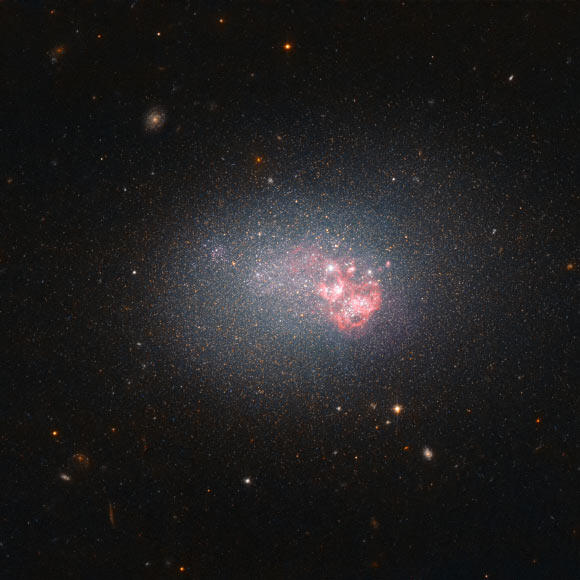LEDA 17302, also known as IRAS 05249-2043 and ESO 553-46, lies 21.8 million light-years away from Earth in the constellation Lepus.
This galaxy is a so-called starburst galaxy — a galaxy undergoing a phase where it spawns stars at a prodigious rate.
In fact, LEDA 17302 has one of the highest rates of star formation of the 1,000 or so galaxies nearest to our Milky Way Galaxy.
Clusters of young, hot stars are speckling the galaxy, burning with a fierce blue glow.
The intense radiation they produce also causes surrounding gas to light up, which is bright red in this image.
The small mass (about a tenth of the size of a typical spiral galaxy such as the Milky Way) and distinctive coloring of galaxies of this type prompted astronomers to classify them, appropriately, as blue compact dwarfs (BCD).
Lacking the clear core and structure that many larger galaxies have, BCD galaxies such as LEDA 17302 are made up of large clusters of hot, massive stars bound together by gravity.
Unusually for galaxies with such intense star-forming regions, BCDs don’t contain either a lot of dust, or the heavy elements that are typically found as trace elements in recently formed stars, making their composition very similar to that of the material from which the first stars formed in the early Universe.
Because of this astronomers consider BCD galaxies to be good objects to study to improve our understanding of primordial star-forming processes.
The color image of LEDA 17302 was made from separate exposures taken in the visible and near-infrared regions of the spectrum with Hubble’s Advanced Camera for Surveys (ACS).
It is based on data obtained through two filters: a wide V-band (F606W) filter and a near-infrared (F814W) filter.
The color results from assigning different hues to each monochromatic image associated with an individual filter.
Source: http://bit.ly/2fXCaU1











